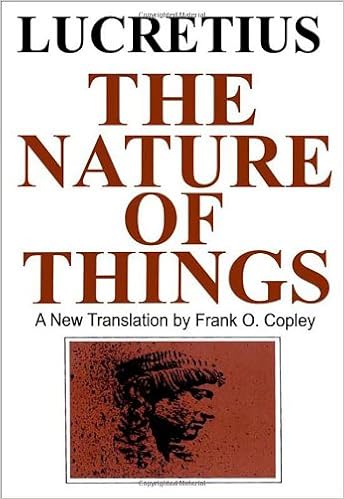The Nature of Things – Titus Lucretius Carus
The Nature of Things – Titus Lucretius Carus – 56 B.C.
Reviewed by: Michael Sympson Date: 15 September 2001
A labor of love.
Rolfe Humphries was an industrious translator of considerable poetic talent. I think I must have read almost everything of him. His Aeneid looks a bit tired, it seems he just slogged through it for the money, but even so, it is far better than Fitzgerald’s and at least as good as Mandelbaum’s. Humphries is the kind of translator who can be recognized by his own style; his translation of Juvenal or Ovid is as much of Humphries as it is a work of Ovid or Juvenal. This is not always what we look for when we want to read an ancient author, but it may be the best compromise available. However Lucretius’ “De Rerum Natura” undoubtedly is Humphries’ labor of love.
 Through the dark ages, Lucretius’ poem has been the secret lifeline for the survival of rational understanding and inquiry. In the renaissance it came out into the open and became the umbilical cord for the birth of modern science. During Voltaire’s era it was the shibboleth among the intellectual opposition to church and religious indoctrination. By a stroke of dumb luck the existence of this poem had eluded its worst enemy because of a lucky misunderstanding. Christian apologists found it simply inconceivable that Lucretius could have meant their ilk as well, when he fulminated against religious madness, fanatic superstition, and the fear of hell as a means of manipulation. In fact they saw in him an ally from the opposite camp, since he seemed to target only pagan superstition. How could he otherwise? Lucretius died some 85 years before the first proclamations of Christianity.
Through the dark ages, Lucretius’ poem has been the secret lifeline for the survival of rational understanding and inquiry. In the renaissance it came out into the open and became the umbilical cord for the birth of modern science. During Voltaire’s era it was the shibboleth among the intellectual opposition to church and religious indoctrination. By a stroke of dumb luck the existence of this poem had eluded its worst enemy because of a lucky misunderstanding. Christian apologists found it simply inconceivable that Lucretius could have meant their ilk as well, when he fulminated against religious madness, fanatic superstition, and the fear of hell as a means of manipulation. In fact they saw in him an ally from the opposite camp, since he seemed to target only pagan superstition. How could he otherwise? Lucretius died some 85 years before the first proclamations of Christianity.
I must admit, that I always thought this poem to be an unreadable monstrosity. Just think of it: an essay that explains nuclear physics set to twelve tone music. I don’t know about you, but people would have to pay me money to listen to that. The least to be expected, would be dry stretches of insufferable boredom. Or so I thought. Well, in the end it was a pleasant surprise. Lucretius did actually produce a real poem. It is a bit on the preachy side, and this poet clearly felt that he was on a mission, but it is the mission of a poetic temperament, of someone who beyond the etiological itch sought to find the link between his perception and the ontology of things. Poetry is sensual thought and it speaks of the cosmic harmony and unity into which we fit, because it is our home.
It is a home in constant repair, it has its leaking roofs and furry critters scuttle through the dank basement, when the lights go off. True poetry doesn’t sentimentalize, and Virgil in his Georgic’s isn’t holding out on us when it comes to the sheer pain of back-braking labor. Neither does Lucretius close his eyes before epidemics and calamities. Life is good, for the simple reason, that this is the only shot we get, but this doesn’t mean, it has to be fair. There are not many minds courageous enough to unflinchingly face the facts without grabbing for the placebos – be it religion or your therapist or a secret obsession with your girlfriends lingerie in the privacy under your bed cover. And this is ok, as long as it remains a placebo – but it turns nasty if one of these hobbies become an obsession and control your life: exactly the point Lucretius is trying to make.
In this respect his poem is by far superior to any modern emulation in the vein of T.S. Eliot’s “Quartet,” which in a typical romantic and post-romantic fashion is more like a desperate hustle for the non-existing fire-escape. The present period is not the most hospitable era for existential honesty and secular sanity; especially Mr. Eliot was not the man to be asked for honesty on this score. But whereas Virgil gives us a hymn of cosmological trust and unsentimental joy in being alive, the much darker temperament of Lucretius permeates his subject with the disillusion of a skeptical seeker.
As a translation we have Humphries at his best behavior which means it comes a tat too slick to account for Lucretius’ archaic contortions, but we readers, who walk safely on established knowledge where the old poet still had to wrestle, have all the advantage. Humphries’ Lucretius has a lighter touch and a more lucid bearing than the Latin original, but the poetic substance is superbly preserved, the prosodic tit for tat, that emulates in English blankvers Lucretius’ experiments with the epic hexameter, has produced a happy and faithful marriage. What more could we ask for?














